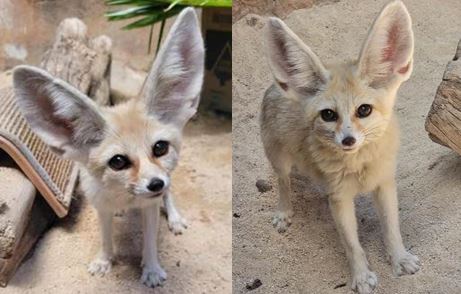Community website by MBC/Ernest Abrams. Call 808-739-9797 for advertising/sponsorship.
Waikiki Get Down - Honolulu, Hawaii
News Item- Powered by MBC NewsMaker
Honolulu Zoo Welcomes Three New Fennec Foxes
- Tweet

Moana, female (left) and Aukai, male (right)
HONOLULU – The Honolulu Zoo recently received a breeding pair of fennec foxes from Oklahoma as a part of the Association of Zoos and Aquariums (AZA) Species Survival Plan. The male and female arrived on April 22, 2022. The foxes were amongst more than 300 animals confiscated from a farm, after having being found malnourished, neglected and abused, and taken to the Wild Care Foundation for recovery and rehabilitation.
The female fennec fox, Moana, and male, Aukai, were required to remain in quarantine for 120 days, during which time Moana gave birth. On June 12, 2022, a male kit named Vaitea was born. For his health and safety, Vaitea is currently housed at the veterinary hospital, while his parents can be seen on exhibit in the African savanna. Vaitea will remain at the hospital until he is vaccinated and fully grown, around 6 months of age, when he can be safely reunited with his parents.
“We are glad to welcome a new family of fennec foxes to our zoo after having lost one of our most popular residents, Puka, our last fennec fox in June at the age of 12,” said Linda Santos, Honolulu Zoo director. “Our staff have embraced the pair of foxes to give them the best possible home, and are working closely with the parents and hand rearing the kit to provide support and ensure their health and welfare.”
Fennec foxes are native to the sandy deserts of North Africa and Arabia and are not endangered. They are the smallest of the fox species but can jump up to three feet high when standing. They have long, soft and thick creamy colored coats with a pure white underside and bushy tails with black tips, which allows them excellent camouflage. They are capable of going for long periods without consuming water and weigh between two to three pounds.
Fennec foxes are noted for having unusually large ears, which can grow between four to six inches and serve to dissipate heat, listen for underground prey and help them to hunt at night. They eat insects, small rodents, birds, eggs and lizards, as well as fruits and leaves to help with hydration. As a nocturnal animal, the fennec fox will create burrows and dig tunnels to hide and sleep in during the day to avoid the heat. Fennec foxes live up to approximately 10 to 12 years under human care.
—PAU—
Questions? Ready for an appointment?
Featured Product/Service
- RELATED LINKS
Calendar
Check out things to do in Waikiki, Hawaii on the calendar of events.News and Newsletters
Keep up with the latest news and happenings in the Waikiki, Hawaii community.Waikiki, Hawaii Featured Pages
View our directory of feature pages showcasing all the great things Waikiki has to offer.Featured Sponsors Offers
Great offers from our sponsors who support the Waikiki, Hawaii Community More...Waikiki, Hawaii Coupons & Discounts
Save money in Waikiki, Hawaii with these coupons.About Waikiki - Honolulu Hawaii
Learn about Waikiki, Hawaii.About Waikiki Get Down.com
Learn about WaikikiGetDown.com website and its creator.
Please send questions about this website to
Copyright© 2012 - 2022 WaikikiGetDown.com. All rights reserved.
Terms of Use / Legal Disclaimer / Privacy Statement
Site Designed and Managed by MacBusiness Consulting
Terms of Use / Legal Disclaimer / Privacy Statement
Site Designed and Managed by MacBusiness Consulting
